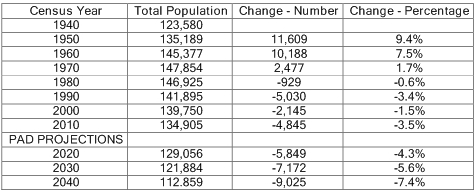- The county population dropped by 3.4% from 139,750 to 134,905 between 2000 and 2010
- Chautauqua County's population was at its highest at 147,854 in 1970
- The city of Jamestown population dropped by 1.8% from 31,903 to 31,146 between 2000 and 2010, and has declined over 20% since 1950
- The Hispanic population in Chautauqua County increased by 39.65% between 2000 and 2010
- Most of the Hispanic population lives in the County's urban areas: with 45% residing in Dunkirk and 25% living in Jamestown
- The largest portion of the County's Hispanic/Latino population is Puerto Rican (86.5%)
- There are approximately 2000-2500 Amish residents in Chautauqua County and they comprise about 2% of the total population
POPULATION – 2010 Census

Source: US Census Bureau State, County & USA Quick Facts quickfacts.census.gov/
LANGUAGE SPOKEN AT HOME (population age 5+)

POPULATION CHAUTAUQUA COUNTY 1940-2040

Source: 1940-2010 Decennial Census and projections by Cornell Program on Applied Demographics (PAD)
- The county population has been declining since the 1980’s, and PAD projections forecast a continual and increasing decline in the population of Chautauqua County.
- Jamestown and Chautauqua County have a higher percentage of senior citizens than NYS and the country as a whole.
- Jamestown has a higher percentage than the county, state and country of young children 0-4. Both of these age groups are considered vulnerable segments of the population and often require assistance and special programs.
AGE DISTRIBUTION

- The median age continues to rise
- Those 65+ are the fastest growing primary segment of the world’s population.
- This is true in the United States as well where median age is currently 36.6% up from 32.9% in 1990
- Local statistics mirror the state and national aging of the population
- The rise in the median age is a reflection of increased longevity and/or declining fertility or bothThis rise of the elderly population and decline in the number of children has implications for education, the workforce and health care.
AGE/SEX DISTRIBUTION

Source: Various US Census
